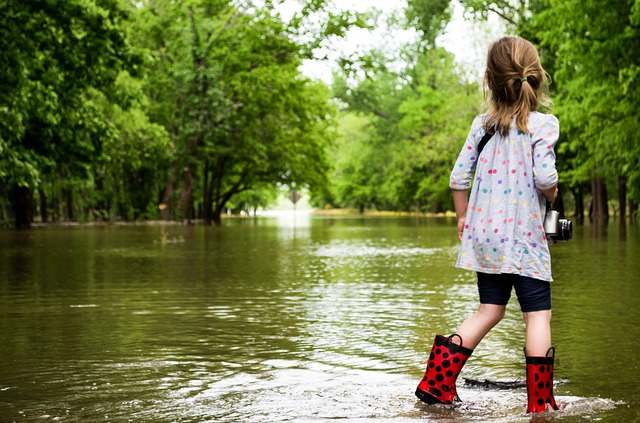In the wake of the recent heavy rains and severe weather in the Tulsa area, the Army Corps of Engineers has announced that they will be releasing even excess water from the Keystone Dam starting Wednesday, May 22. This means areas near the already-swollen Arkansas River may experience flooding at levels not seen since 1986. Evacuations are underway in several towns along the river, including neighborhoods in Sand Springs, Fort Gibson and Bixby. We’re already making emergency preparations for our offices in Jenks.
If you live in or near one of these flood-prone areas, you may naturally have some concerns about your hardwood floors—and rightly so. Left unchecked, water can do irreversible damage to wood flooring. That said, if you act quickly, there are some things you can do to mitigate the damage and possibly even save your floors. As we brace for this potential disaster, here are some key things to keep in mind.
Take Precautions Even if You’re Not in the Flood Zone
You don’t have to be near the river to experience water or moisture damage. With all the rains we’ve had, the soil is saturated and the water table beneath us is also rising. Excess moisture and water can seep into your subfloors from under your foundation, doing damage to your floors even without your knowledge. Even the high humidity is probably not doing your floors any favors right now. Consider taking the following precautions to protect your hardwood floors:
- Make sure your gutters and drains are clear. Check around the house to make sure rain water is draining off and away from your home.
- Take note of any ponding of water in your yard. This can be a sign of poor drainage or a high water table.
- Check baseboards, walls and corners for signs of moisture or water stains.
- Run fans and dehumidifiers in the home to keep humidity and moisture at bay.
- Move furniture out of harm’s way if your home is in danger of actual flooding.
If Your Home Is Flooded…
If the worst happens and flood waters enter your home, it’s a race against the clock to salvage your hardwood floors—the first 24 hours are critical. Take the following steps:
- Guard your own safety first. If your neighborhood is being evacuated, don’t stay for the sake of your floors. Don’t jeopardize your life or health. Floors can be replaced; you can’t. (Neither can your family.)
- Begin water removal as soon as it’s safe. Use a wet vac for minor flooding so take up the excess water. Keep vacuuming even after the floor appears dry, as there will probably still be some moisture in the crevices and subfloor. If you have carpeting, pull up the carpet and padding and remove it—it will probably not be salvageable. For significant flooding, hire a professional disaster recovery company to bring pumps to remove the water.
- Remove baseboards and cut away sections of moistened drywall. This reduces the risk of harmful mold growth, which can occur within 48-72 hours of a flood.
- Set up dehumidifiers and fans throughout the affected area. These need to run for up to 3 days to help remove the excess moisture that has seeped into the wood pores. Running your air conditioner will also help.
Evaluating the Damage
For wood floors that are exposed to significant moisture—for example, if flood waters cover your floor—there’s a good chance they will experience at least some damage. Time is of the essence here. If you can remove the water within a few hours and quickly get dehumidifiers running, the damage may be imperceptible, especially if you had a protective sealant on the floors. If you begin water removal within the first 24 hours and get the floors dried quickly, you may need to sand and refinish the floors to restore them, but this will still be less costly than replacing them. Any longer than a day, and between moisture and mold, it’s a fair bet they will need to be replaced as part of your recovery efforts. The cost of replacement may be covered if you have flood insurance.
If you are affected by the flood waters and you are unsure of the steps you need to take to replace your floors, Renaissance Hardwood Flooring is here to help. For a free evaluation and expert advice, give us a call at 918-298-4477. Most importantly—stay safe!

